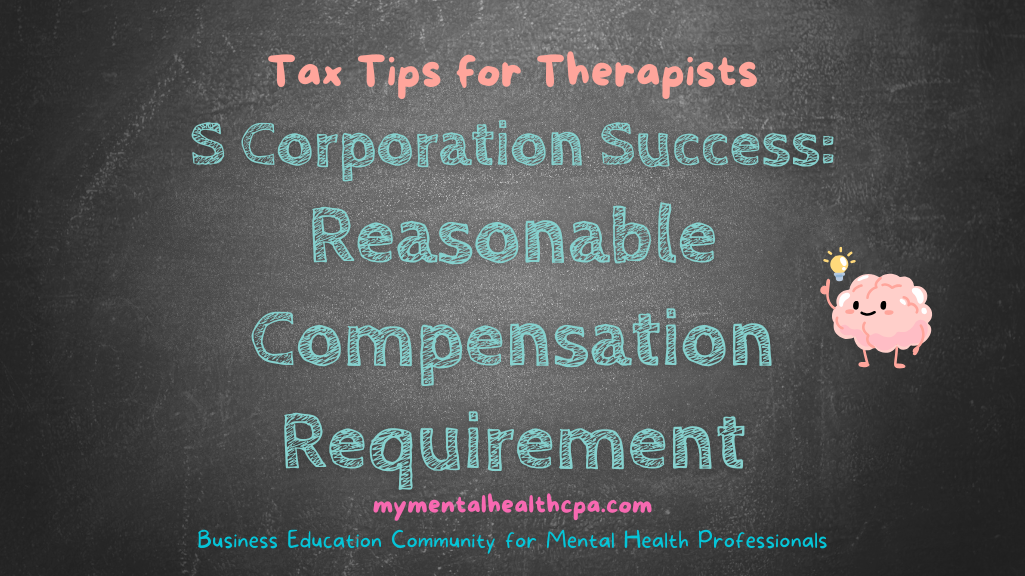August 1, 2024
Avoid IRS Audits: Ensuring Reasonable Compensation for Therapists with S Corporations

As a therapist operating as an S Corporation, you’re likely aware of the tax benefits, such as avoiding double taxation. However, one critical aspect that often gets overlooked is “reasonable compensation.” The IRS requires that any shareholder providing services to their S Corporation receives fair market compensation. Failing to meet this requirement can lead to significant tax penalties and other legal issues. This article explores what reasonable compensation means, its importance, and how to ensure compliance.
What is Reasonable Compensation?
Reasonable compensation is the fair market value for the services a shareholder-employee provides to their S Corporation. The IRS closely monitors S Corporations to ensure shareholder-employees are paid appropriately because salaries are subject to payroll taxes, while distributions are not. If the IRS finds that compensation is unreasonably low, it can reclassify distributions as wages, resulting in back taxes, penalties, and interest.
Why Is Reasonable Compensation Crucial for Therapists?
- IRS Compliance: The IRS focuses on ensuring S Corporations adhere to compensation guidelines. Non-compliance can trigger audits and hefty penalties.
- Effective Tax Planning: Proper compensation balances your tax obligations, optimizing both payroll and income taxes.
- Business Credibility: Aligning compensation with industry standards enhances credibility with the IRS, financial institutions, and potential investors.
Factors Influencing Reasonable Compensation
To determine if compensation is reasonable, the IRS considers several factors:
- Role and Responsibilities: The nature of the work performed significantly affects salary levels.
- Industry Standards: What similar roles in your industry are paid, based on salary surveys or reports.
- Time Commitment: The amount of time dedicated to the business impacts the reasonable salary.
- Company Size and Profitability: Larger, more profitable companies may justify higher salaries.
How My Mental Health CPA and Fortitude Tax & Accounting Can Assist
Determining reasonable compensation can be challenging, but our partnership with Fortitude Tax & Accounting offers comprehensive support. We provide a detailed, data-driven analysis through our reasonable compensation analysis tool, ensuring your compensation aligns with IRS standards. This service helps you:
- Avoid IRS Audits: An “audit-proof” analysis report ensures your compensation is defensible.
- Optimize Tax Savings: Balancing salary and distributions correctly maximizes your tax benefits.
- Gain Peace of Mind: Expert analysis gives you confidence in your compensation strategy’s compliance and optimization.
Ready to Ensure Your Compensation Strategy is “Audit Proof”?
Setting your compensation correctly is not only a best practice but also a legal requirement for S Corporations. With the support of Fortitude Tax & Accounting, you can navigate these requirements confidently and effectively. Don’t leave your compensation strategy to chance—reach out to us today to schedule your reasonable compensation analysis and protect your practice from unnecessary risks.
1. What is reasonable compensation for a therapist in an S Corporation?
Reasonable compensation is the fair market value for services you provide as a shareholder-employee. It must align with industry standards and your role’s responsibilities.
2. How does the IRS determine if my compensation is reasonable?
The IRS considers factors like your role, time commitment, industry standards, and company profitability to assess if your salary is reasonable.
3. What happens if the IRS finds my compensation is too low?
If your compensation is unreasonably low, the IRS can reclassify distributions as wages, leading to back taxes, penalties, and interest.
4. Why is reasonable compensation particularly important for therapists?
Therapists in private practice need to ensure their compensation aligns with IRS guidelines to avoid audits and penalties while optimizing tax benefits.
5. How can I determine the right salary for my role in an S Corporation?
Consulting with professionals like Fortitude Tax & Accounting can help you perform a reasonable compensation analysis to align with IRS standards.
6. Can I pay myself entirely in distributions instead of a salary?
No, the IRS requires that you pay yourself a reasonable salary before taking distributions to avoid penalties and back taxes.
7. How often should I review my compensation strategy?
It’s advisable to review your compensation annually or when there are significant changes in your business to ensure ongoing compliance.
8. What tools or services are available to help with reasonable compensation?
Services like those offered by Fortitude Tax & Accounting provide detailed, audit-proof reasonable compensation analysis to ensure compliance and optimize tax savings.
Need Help with Your S Corporation?
At My Mental Health CPA, powered by Fortitude Tax & Accounting, we specialize in proactive tax planning and compliance for therapists. Whether you’re establishing a new S Corporation or managing an existing one, our team is here to help. Book a consultation to ensure your compensation strategy is both compliant and optimized.
This article is for informational purposes only and does not constitute legal, business, or tax advice. Please consult your advisors for guidance specific to your situation.



Leave a Reply